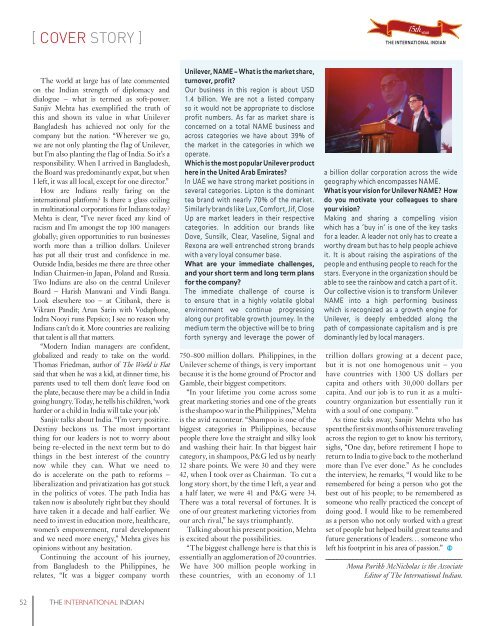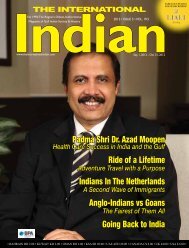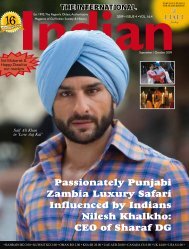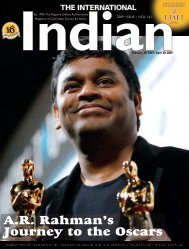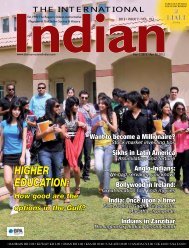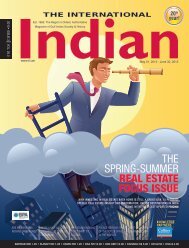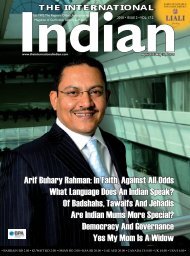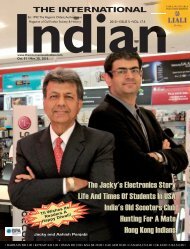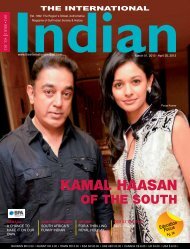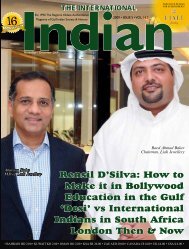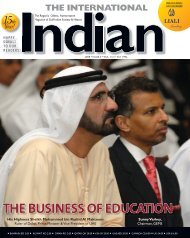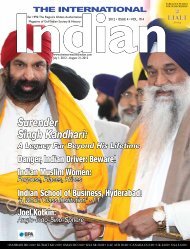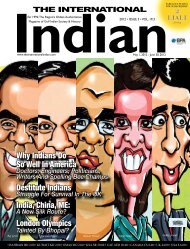THE INTERNATIONAL - International Indian
THE INTERNATIONAL - International Indian
THE INTERNATIONAL - International Indian
Create successful ePaper yourself
Turn your PDF publications into a flip-book with our unique Google optimized e-Paper software.
[ COVER STORY ]<br />
The world at large has of late commented<br />
on the <strong>Indian</strong> strength of diplomacy and<br />
dialogue – what is termed as soft-power.<br />
Sanjiv Mehta has exemplified the truth of<br />
this and shown its value in what Unilever<br />
Bangladesh has achieved not only for the<br />
company but the nation. “Wherever we go,<br />
we are not only planting the flag of Unilever,<br />
but I’m also planting the flag of India. So it’s a<br />
responsibility. When I arrived in Bangladesh,<br />
the Board was predominantly expat, but when<br />
I left, it was all local, except for one director.”<br />
How are <strong>Indian</strong>s really faring on the<br />
international platform? Is there a glass ceiling<br />
in multinational corporations for <strong>Indian</strong>s today?<br />
Mehta is clear, “I’ve never faced any kind of<br />
racism and I’m amongst the top 100 managers<br />
globally; given opportunities to run businesses<br />
worth more than a trillion dollars. Unilever<br />
has put all their trust and confidence in me.<br />
Outside India, besides me there are three other<br />
<strong>Indian</strong> Chairmen-in Japan, Poland and Russia.<br />
Two <strong>Indian</strong>s are also on the central Unilever<br />
Board – Harish Manwani and Vindi Banga.<br />
Look elsewhere too – at Citibank, there is<br />
Vikram Pandit; Arun Sarin with Vodaphone,<br />
Indra Nooyi runs Pepsico; I see no reason why<br />
<strong>Indian</strong>s can’t do it. More countries are realizing<br />
that talent is all that matters.<br />
“Modern <strong>Indian</strong> managers are confident,<br />
globalized and ready to take on the world.<br />
Thomas Friedman, author of The World is Flat<br />
said that when he was a kid, at dinner time, his<br />
parents used to tell them don’t leave food on<br />
the plate, because there may be a child in India<br />
going hungry. Today, he tells his children, ‘work<br />
harder or a child in India will take your job.’<br />
Sanjiv talks about India. “I’m very positive.<br />
Destiny beckons us. The most important<br />
thing for our leaders is not to worry about<br />
being re-elected in the next term but to do<br />
things in the best interest of the country<br />
now while they can. What we need to<br />
do is accelerate on the path to reforms –<br />
liberalization and privatization has got stuck<br />
in the politics of votes. The path India has<br />
taken now is absolutely right but they should<br />
have taken it a decade and half earlier. We<br />
need to invest in education more, healthcare,<br />
women’s empowerment, rural development<br />
and we need more energy,” Mehta gives his<br />
opinions without any hesitation.<br />
Continuing the account of his journey,<br />
from Bangladesh to the Philippines, he<br />
relates, “It was a bigger company worth<br />
Unilever, NAME – What is the market share,<br />
turnover, profit?<br />
Our business in this region is about USD<br />
1.4 billion. We are not a listed company<br />
so it would not be appropriate to disclose<br />
profit numbers. As far as market share is<br />
concerned on a total NAME business and<br />
across categories we have about 39% of<br />
the market in the categories in which we<br />
operate.<br />
Which is the most popular Unilever product<br />
here in the United Arab Emirates?<br />
In UAE we have strong market positions in<br />
several categories. Lipton is the dominant<br />
tea brand with nearly 70% of the market.<br />
Similarly brands like Lux, Comfort, Jif, Close<br />
Up are market leaders in their respective<br />
categories. In addition our brands like<br />
Dove, Sunsilk, Clear, Vaseline, Signal and<br />
Rexona are well entrenched strong brands<br />
with a very loyal consumer base.<br />
What are your immediate challenges,<br />
and your short term and long term plans<br />
for the company?<br />
The immediate challenge of course is<br />
to ensure that in a highly volatile global<br />
environment we continue progressing<br />
along our profitable growth journey. In the<br />
medium term the objective will be to bring<br />
forth synergy and leverage the power of<br />
750-800 million dollars. Philippines, in the<br />
Unilever scheme of things, is very important<br />
because it is the home ground of Proctor and<br />
Gamble, their biggest competitors.<br />
“In your lifetime you come across some<br />
great marketing stories and one of the greats<br />
is the shampoo war in the Philippines,” Mehta<br />
is the avid raconteur. “Shampoo is one of the<br />
biggest categories in Philippines, because<br />
people there love the straight and silky look<br />
and washing their hair. In that biggest hair<br />
category, in shampoos, P&G led us by nearly<br />
12 share points. We were 30 and they were<br />
42, when I took over as Chairman. To cut a<br />
long story short, by the time I left, a year and<br />
a half later, we were 41 and P&G were 34.<br />
There was a total reversal of fortunes. It is<br />
one of our greatest marketing victories from<br />
our arch rival,” he says triumphantly.<br />
Talking about his present position, Mehta<br />
is excited about the possibilities.<br />
“The biggest challenge here is that this is<br />
essentially an agglomeration of 20 countries.<br />
We have 300 million people working in<br />
these countries, with an economy of 1.1<br />
a billion dollar corporation across the wide<br />
geography which encompasses NAME.<br />
What is your vision for Unilever NAME? How<br />
do you motivate your colleagues to share<br />
your vision?<br />
Making and sharing a compelling vision<br />
which has a ‘buy in’ is one of the key tasks<br />
for a leader. A leader not only has to create a<br />
worthy dream but has to help people achieve<br />
it. It is about raising the aspirations of the<br />
people and enthusing people to reach for the<br />
stars. Everyone in the organization should be<br />
able to see the rainbow and catch a part of it.<br />
Our collective vision is to transform Unilever<br />
NAME into a high performing business<br />
which is recognized as a growth engine for<br />
Unilever, is deeply embedded along the<br />
path of compassionate capitalism and is pre<br />
dominantly led by local managers.<br />
trillion dollars growing at a decent pace,<br />
but it is not one homogenous unit – you<br />
have countries with 1300 US dollars per<br />
capita and others with 30,000 dollars per<br />
capita. And our job is to run it as a multicountry<br />
organization but essentially run it<br />
with a soul of one company. ”<br />
As time ticks away, Sanjiv Mehta who has<br />
spent the first six months of his tenure traveling<br />
across the region to get to know his territory,<br />
sighs, “One day, before retirement I hope to<br />
return to India to give back to the motherland<br />
more than I’ve ever done.” As he concludes<br />
the interview, he remarks, “I would like to be<br />
remembered for being a person who got the<br />
best out of his people; to be remembered as<br />
someone who really practiced the concept of<br />
doing good. I would like to be remembered<br />
as a person who not only worked with a great<br />
set of people but helped build great teams and<br />
future generations of leaders… someone who<br />
left his footprint in his area of passion.”<br />
Mona Parikh McNicholas is the Associate<br />
Editor of The <strong>International</strong> <strong>Indian</strong>.<br />
52<br />
<strong>THE</strong> <strong>INTERNATIONAL</strong> INDIAN


